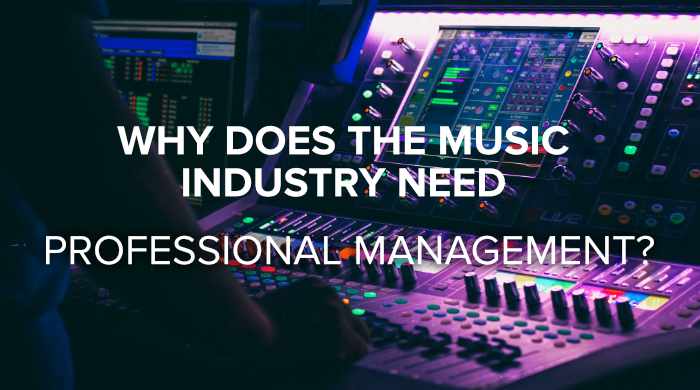The Problem
The last 20 years has been a rollercoaster ride for the music industry. Physical sales fell off a cliff, and piracy took great white shark-sized bites out of what used to be called profit before Spotify came to the rescue…sort of.
Music businesses are often run by people who are passionate about music, which is absolutely essential. Unfortunately, that doesn’t always mean they have the necessary insight or skill to navigate a complex, fast-changing business landscape. Could the crisis have been averted or at least foreseen?
Music businesses are often run by people who are passionate about music, which is absolutely essential. Unfortunately, that doesn’t always mean they have the necessary insight or skill to navigate a complex, fast-changing business landscape. Could the crisis have been averted or at least foreseen?
What does music management mean in practise?
Management consultants are, broadly speaking, big on management theory and practice but not necessarily passionate about the businesses they are hired to help. However, they do have an interesting skill that everyone who aspires to a management position in the industry, or who wants to start a music business, should take note of - 'strategic vision'. This isn’t just a gobbledygook jargon phrase. It means applying some tried and tested methodology to working out what’s going on with your approach and how you can make it better. It means learning some frameworks and approaches that allow you to quantify risk and opportunity. Analytical tools like "Porter’s five forces" and the "Ansoff Matrix" are much more than just “what people with MBAs do”. They are like those blacklight torches they use on CSI that mysteriously reveal things you can’t see with the naked eye. They show you things you have probably missed and allow you to take action accordingly.
Arguably, had more senior managers in the music industry in the late '90s had this kind of strategic vision, they would have been in a better position to foresee the consequences of new technology on their industry and potentially do something about it.
Arguably, had more senior managers in the music industry in the late '90s had this kind of strategic vision, they would have been in a better position to foresee the consequences of new technology on their industry and potentially do something about it.

The Solution
When the solution did finally come along, Spotify was a tech start-up. Even though music licencing and deal making (very much the specialist subject of music industry execs) was at the heart of the fledgling business, Spotify was not a music business. Daniel Ek, founder of Spotify, is a technologist and not a music industry person.
It was Ek's insight that saved the day when he retells "I realised that you can never legislate away from piracy. Laws can definitely help, but it doesn't take away the problem. The only way to solve the problem was to create a service that was better than piracy and at the same time compensates the music industry – that gave us Spotify."
The founder of Audio Network, Andrew Sunnucks, put it very succinctly when he told me "You should never look in the rear-view mirror to work out what’s going to happen next". He didn’t, and his music business sold for $215 million.
It was Ek's insight that saved the day when he retells "I realised that you can never legislate away from piracy. Laws can definitely help, but it doesn't take away the problem. The only way to solve the problem was to create a service that was better than piracy and at the same time compensates the music industry – that gave us Spotify."
The founder of Audio Network, Andrew Sunnucks, put it very succinctly when he told me "You should never look in the rear-view mirror to work out what’s going to happen next". He didn’t, and his music business sold for $215 million.
Conclusion
So what does this tell us? If you want to build a successful music business you need passion for music and a strong foundation in business and management theory. They are both essential to success. With just the former you risk wasting years pursuing a forlorn dream that is fatally flawed from the outset and missing the real opportunities which are sitting right under your nose. It doesn’t mean joining the suits, it simply means avoiding bear traps you didn’t know were there or seeing opportunities you would have missed otherwise.
MA International Music Business
MA International Music Business is a master’s degree that combines the twin worlds of the music industry and management theory. The goal is to produce the entrepreneurs and industry visionaries of the future. If you are looking for a Master’s in Music Business that will truly equip you for a lifelong career in the music industry. It follows the same approach as an MBA in Music Business but with a sharper focus and more practical insights into music industry itself.
- Mentored by current top music industry execs and practitioners.
- Cutting edge management and business theory focussed on the creative industries.
- Strategy, analysis, copyright and contracts, negotiation, income streams and more.
- Perfect for the start up entrepreneur or industry career builder.
Learn More About International Music Business
